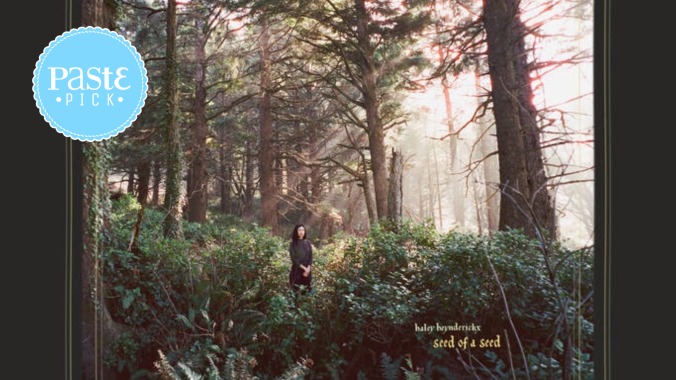Haley Heynderickx Sifts Through the Mud of Life on Seed of a Seed
The one-of-a-kind Oregon songwriter-meets-naturalist embraces both the ugliness and beauty of her own storyline on her long-awaited second LP.

We can avoid a lot of unpleasantness by looking down at our devices. We can swerve frightening feelings, eliminate boredom or temporarily drop out of a constant loop of self-doubt with a cheery podcast, a never-ending for-you-page or a meditation app. We can ignore what songwriter Haley Heynderickx refers to as “the haggard things” we “don’t want to feel.”
But being in touch with ourselves, and nature, is key to a healthier inner life, or so the story goes on Heynderickx’s marvelous new album Seed of a Seed. This path looks different for everyone, and this is not to say she has it all figured out, but in Heynderickx’s music, a confrontation with emotion is as crucial to longevity as food and water. And nature isn’t just something to get away to for a weekend, or the weeds cracking in the sidewalk or a sunbeam unspooling onto your Wayfair rug—nature’s very rhythms are woven into each note. It’s all connected. Heynderickx sings, “Man, I’d do anything to hear the Redwoods talk.” But on Seed, I can hear them singing.
The Redwoods are just part of a big biological chorus on Seed of a Seed. You can hear the squish of the meadow beneath boots on “Foxglove,” the crashing of a wave on “Swoop” and the creeping proliferation of algae on “Mouth of a Flower.” From savoring a purple clover to tasting the sweet dew of morning, every breath of Seed is in communion with nature. It’s part of a tasting menu that also features the works of Walt Whitman and Barbara Kingsolver.
The guitar work may sound uncomplicated at first blush, but that’s only because it’s so effortless. Haley Heynderickx is a true triple threat—vocalist, lyricist and guitarist—and her genius arrangements unfold upon repeat listens. Opener “Gemini” is a frantic self-takedown that features some of the most seductive strums of the album. The chords on “Jerry’s Song” pleasantly burble up over the smooth stones of bass, cello and layered vocals. And “Spit in the Sink” is a poem—about how we all try to create in spite of a tech-sick world that tells us creativity isn’t useful—that thanks to a sinewy melody proves itself as a song over and over again.
-

-

-

-

-

-

-

-

-

-

-

-

-

-

-

-

-

-

-

-

-

-

-

-

-

-

-

-

-

-

-

-

-

-

-

-

-

-

-

-








































